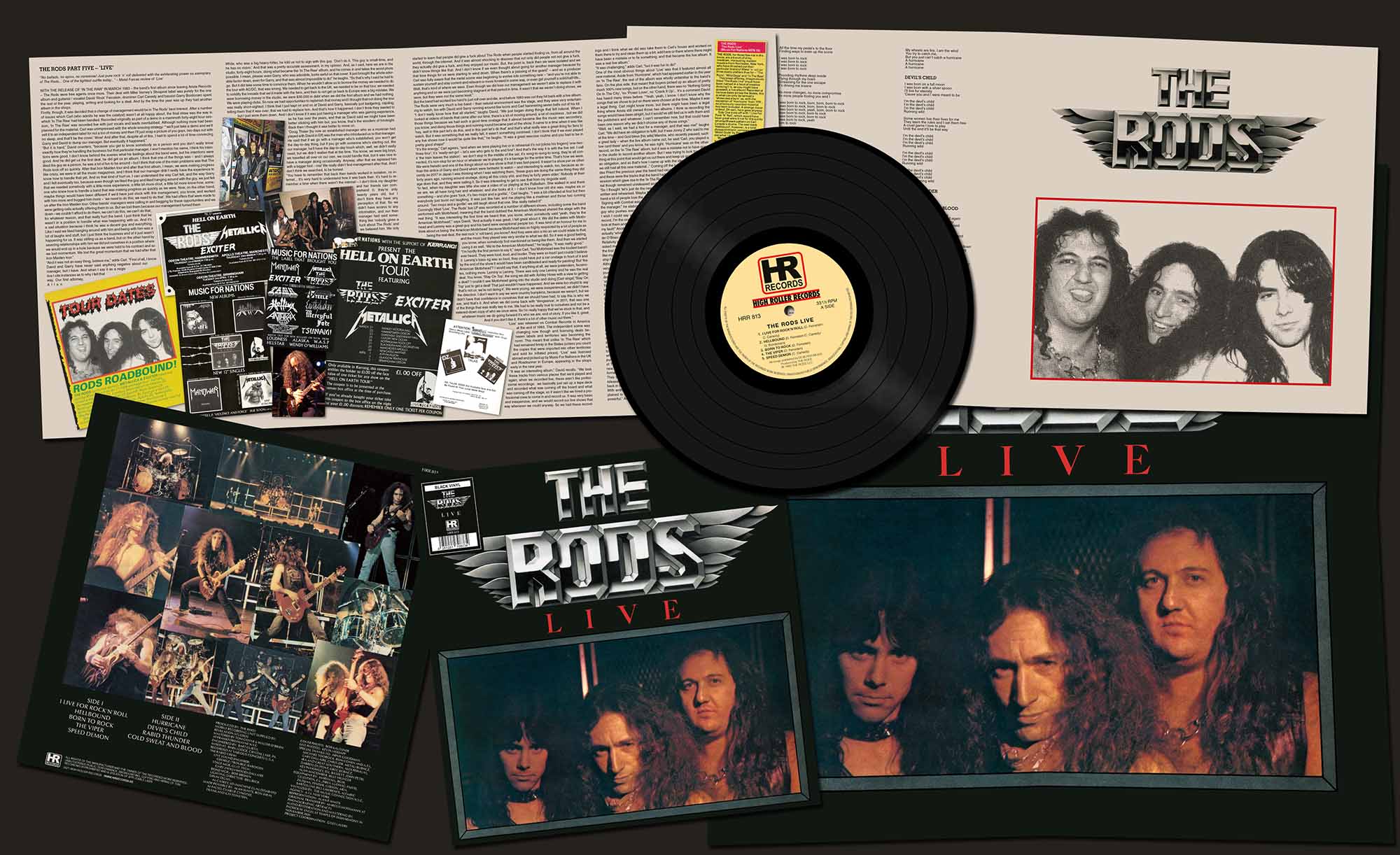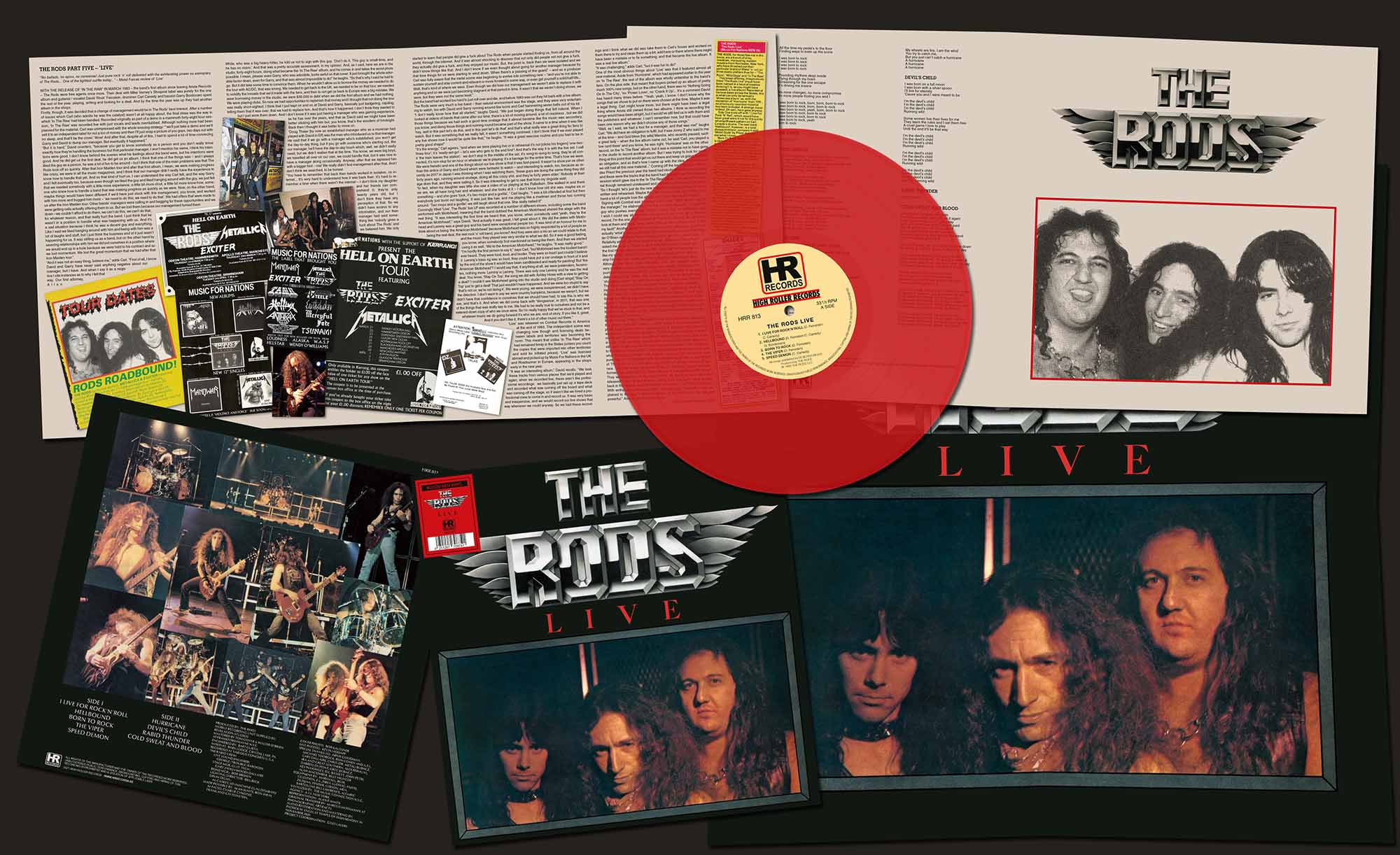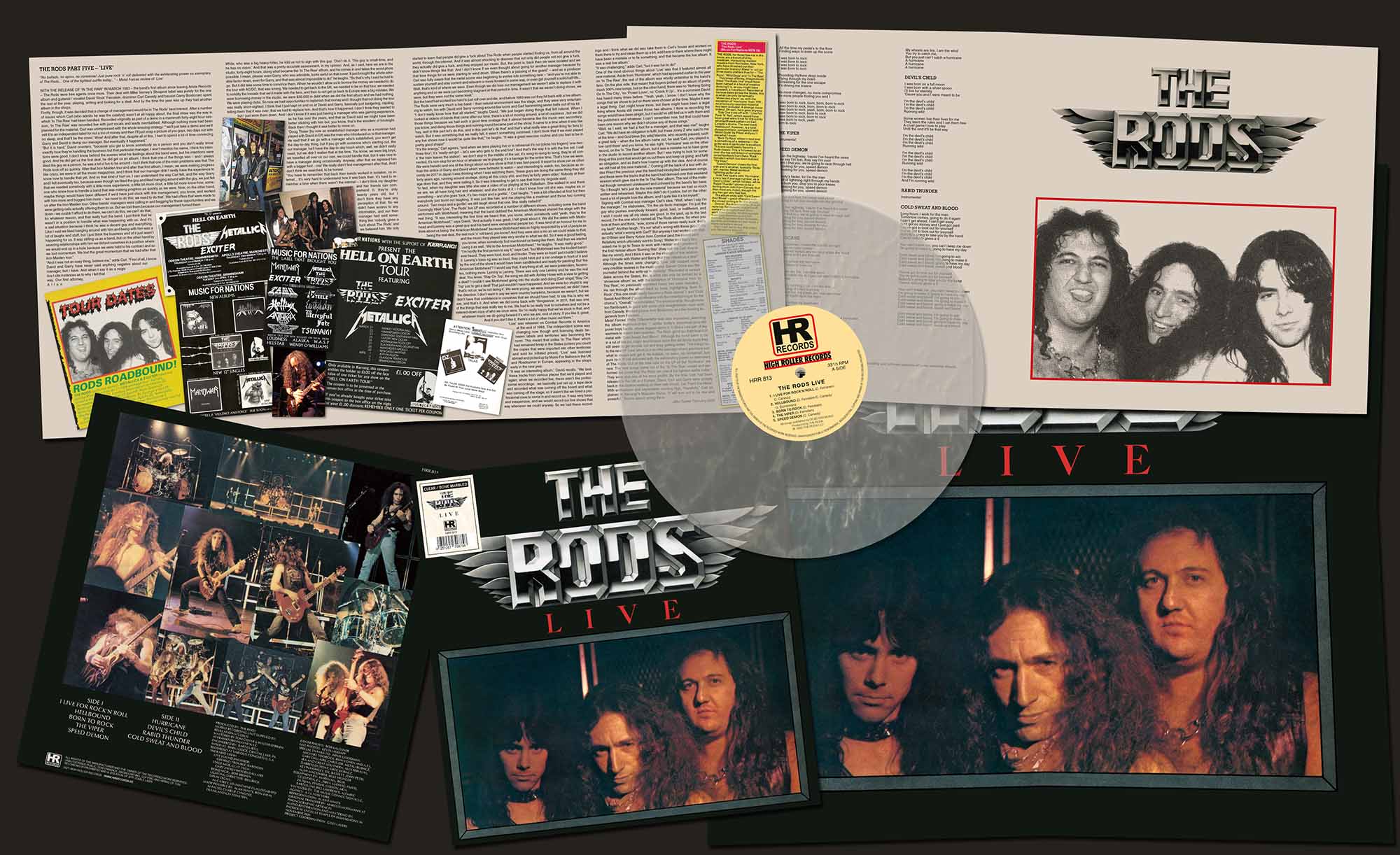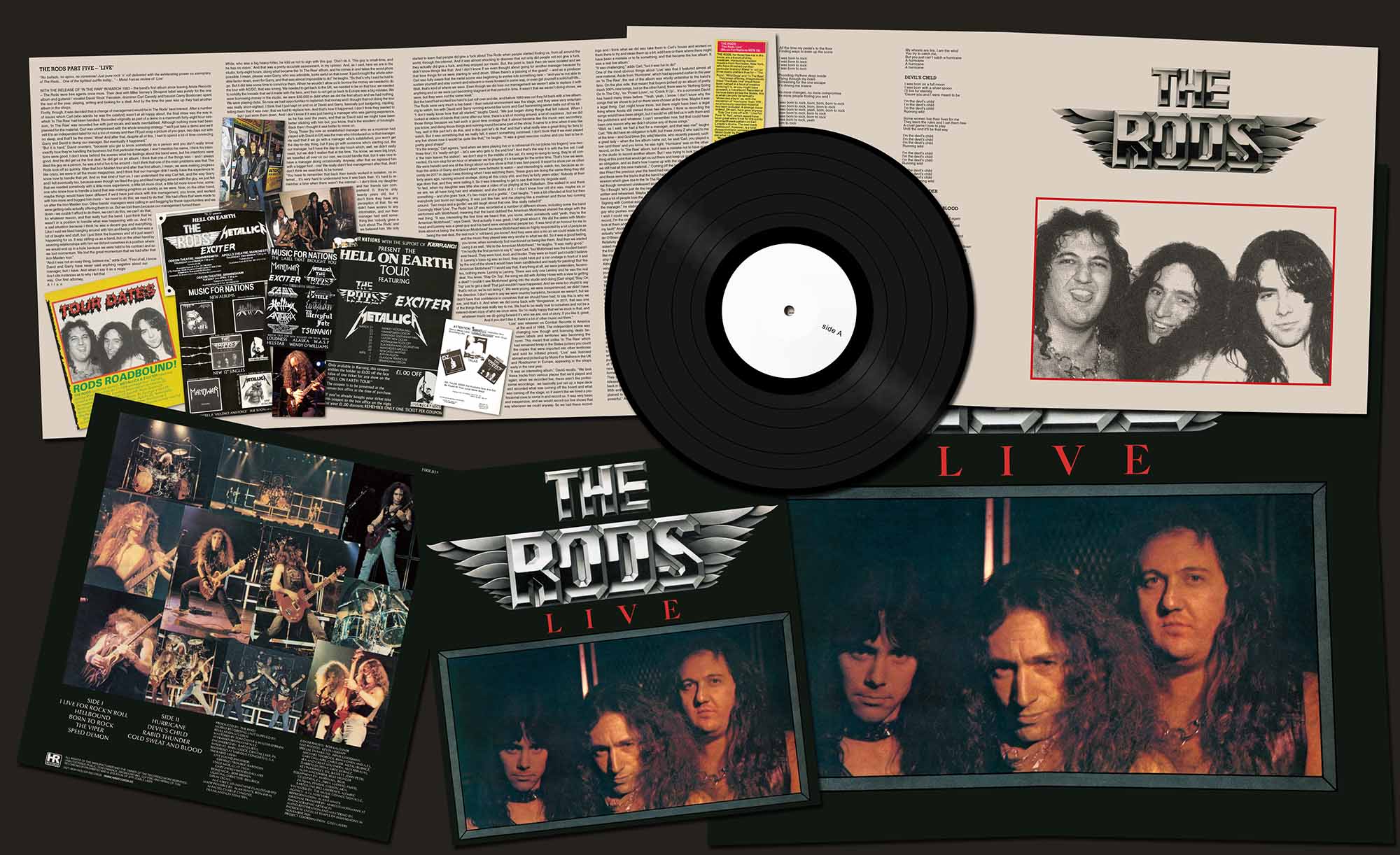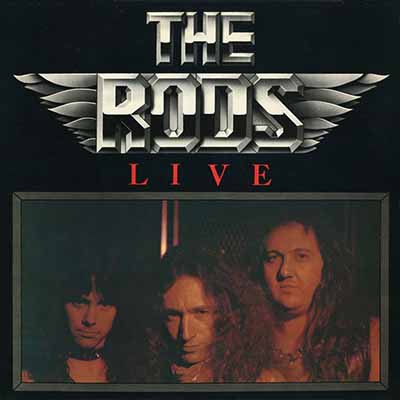 | ||||
| THE RODS - Live LP | |
HRR 813LP, ltd 500, 200 x black, 200 x transparent blood-red vinyl, 100 x milky clear/ bone marbled (HRR mailorder exclusive), 425gsm heavy cardboard cover, 4 page insert printed on uncoated paper, poster | |
| David “Rock” Feinstein - Guitar & Vocals Garry Bordonaro - Bass & Vocals Carl Canedy - Drums & Vocals | |
| 01 I Live for Rock'n'Roll 02 Hellbound 03 Born to Rock 04 The Viper 05 Speed Demon 06 Hurricane 07 Devil's Child 08 Rabid Thunder 09 Cold Sweat and Blood | |
AVAILABLE | |
Original transfer by Marcus Mossmann at PHONOGRAPHIC ARTIFACTS. Audio restoration and mastering by Patrick W. Engel at TEMPLE OF DISHARMONY in November 2020. Cutting by SST Germany on Neumann machines for optimal quality on all levels...
“No ballads, no epics, no nonsense! Just pure rock ‘n’ roll delivered with the exhilarating power so exemplary of The Rods... One of the tightest outfits today...” – Metal Forces review of ‘Live’
WITH THE RELEASE OF ‘IN THE RAW’ IN MARCH 1983 – the band’s first album since leaving Arista Records – The Rods were free agents once more. Their deal with Mike Varney’s Shrapnel label was purely for the one album and guitarist / vocalist David ‘Rock’ Feinstein, drummer Carl Canedy and bassist Garry Bordonaro spent the rest of the year, playing, writing and looking for a deal. And by the time the year was up they had another album in the shops.
Firstly, though, it was decided that a change of management would be in The Rods’ best interest. After a number of issues which Carl (who admits he was the catalyst) wasn’t at all happy about, the final straw was the way in which ‘In The Raw’ had been handled. Recorded originally as part of a demo in a mammoth forty-eight hour session, ‘In The Raw’ was recorded live with just vocals and leads overdubbed. Although nothing more had been planned for the material, Carl was unimpressed with the whole ensuing strategy: “‘we’ll just take a demo and we’ll sell it to an independent label for not a ton of money and then I’ll just snap a picture of you guys, two days out with no sleep, and that’ll be the cover.’ Wow! And after that, despite all of this, I had to spend a lot of time convincing Garry and David to dump our manager. But eventually it happened.”
“But it is hard,” David counters, “because you get to know somebody as a person and you don’t really know exactly how they’re handling the business but that particular manager, I won’t mention his name, I think his intentions were good. I don’t know behind the scenes what his feelings about the band were, but his intentions were good. And he did get us the first deal, he did get us an album. I think that one of the things was – and I always liked the guy as a person, he was a lot of fun to be around – but I think that one of the main problems was that The Rods took off so quickly. After that Iron Maiden tour and after that first album, I mean, we were making progress like crazy, we were in all the music magazines, and I think that our manager didn’t really have the experience to know how to handle that yet. And so that kind of hurt us. I can understand the way Carl felt, and the way Garry and I felt eventually too, because even though we liked the guy and liked hanging around with the guy, we just felt that we needed somebody with a little more experience, a little bit more clout, a little bit more know-how, someone who knew how to handle a band that was making progress as quickly as we were. Now, on the other hand, maybe things would have been different if we’d have just stuck with this management, you know, and worked with him more and bugged him more – ‘we need to do this; we need to do that’. We had offers that were made to us after the Iron Maiden tour. Other bands’ managers were calling in and begging for these opportunities and we were getting calls actually offering them to us. But we lost them because our management turned them down –we couldn’t afford to do them, we can’t do this, we can’t do that, for whatever reason, and that really hurt the band. I just think that he wasn’t in a position to handle what was happening with us. And it’s a sad situation because I think he was a decent guy and everything. Like I said we liked hanging around with him and being with him was a lot of laughs and stuff, but I just think the business end of it just wasn’t happening for us. It was stifling us as a band, but on the other hand by severing relationships with him we did put ourselves in a position where we would end up in a hole because we were held to his contract and so we lost momentum. We lost the great momentum that we had after that Iron Maiden tour.”
“And it was not an easy thing, believe me,” adds Carl. “First of all, I know David and Garry have never said anything negative about our manager, but I have. And when I say it as a negative I cite instances as to why I felt that way. Our first attorney, Allan White, who was a big heavy-hitter, he told us not to sign with this guy. ‘Don’t do it. This guy is small-time, and he has no vision.’ And that was a pretty accurate assessment, in my opinion. And, as I said, here we are in the studio, forty-eight hours, doing what became the ‘In The Raw’ album, and he comes in and takes the worst photo possible. I mean, please: even Garry, who was adorable, looks awful on that cover. It just brought the whole adorable factor down, even for Garry, and that was almost impossible to do!” he laughs. “So that’s why I said he had to go. But it did take some time to convince them. When he wouldn’t allow us to borrow the money we needed to do the tour with AC/DC, that was wrong. We needed to get back to the UK, we needed to be on that tour, we needed to solidify the inroads that we’d made with the fans, and then to not get us back to Europe was a big mistake. We were borrowing money in the studio, we were $30,000 in debt when we did the first album and we had nothing. We were playing clubs. So now we had opportunities to replenish that money and I thought that not doing the tour was really short-sighted. I think that I just kept on and on at David and Garry, basically just badgering, cajoling, telling them that it was over; that we had to replace him. And that’s how it happened. I don’t think they wanted to but I just wore them down. And I don’t know if it was just having a manager who was gaining experience, as he has over the years, and that as David said we might have been better sticking with him but, you know, that’s the wonders of hindsight. Back then I thought it was better to move on.
“Doug Thaler [by now an established manager who as a musician had played with David in Elf"> was the man who introduced us to that manager. He said that if we go with a manager who’s established, you won’t get the day-to-day thing, but if you go with someone who’s starting out, like our manager, he’ll have the day-to-day touch which, well, we didn’t really need, but we didn’t realise that at the time. You know, we were big boys, we travelled all over on our own, we could handle that, but it was nice to have a manager along occasionally. Anyway, after that we replaced him with a bigger fool – me! We really didn’t find management after that. And I don’t think we searched, to be honest.
“You have to remember that back then bands worked in isolation, no internet... It’s very hard to understand how it was back then. It’s hard to remember a time when there wasn’t the internet – I don’t think my daughter and her friends can comprehend it; they’re only twenty years old, but I don’t think they have any perception of that. So we didn’t have access to any information, and our then manager had said something like ‘nobody gives a fuck about The Rods’ and we believed him. We only started to learn that people did give a fuck about The Rods when people started finding us, from all around the world, through the internet. And it was almost shocking to discover that not only did people not not give a fuck, they actually did give a fuck, and they enjoyed our music. But, the point is, back then we were isolated and we didn’t know things like that. And I don’t know if we even thought about going for another manager because by that time things for us were starting to wind down. When there’s a passing of the guard” – and as a producer Carl was fully aware that the metal scene was beginning to evolve into something new – “and you’re not able to sustain yourself and stay current and relevant or move forward in some way, or even get yourself a solid half-life... Well, that’s kind of where we were. Even though we did lose our management we weren’t able to replace it with anything and so we were just becoming stagnant at that period in time. It wasn’t that we weren’t doing shows, we were, but they were not the same level.”
But the band had worked too hard to just roll over and die, and before 1983 was out they hit back with a live album. The Rods were very much a live band – their natural environment was the stage, and they were very entertaining to watch, too with David and Garry running around like loons and Carl hammering seven bells out of his kit.
“I don’t really know how that all started,” laughs David. “We just began doing things that felt natural. When I looked at videos of bands that came after our time, there’s a lot of moving around, a lot of craziness , but we did those things because we had such a good time onstage that it almost became like the music was secondary, you know, and doing those things and running round became part of the show. It came to a time when it was like ‘hey, well in this part let’s do this, and in this part let’s do that’ and that’s what really was a great thing for fans to watch. But it was something that we really felt, it wasn’t something contrived. I don’t think that if we ever played any live shows now it would be quite like that,” he laughs. “It was a great exercise routine and you had to be in pretty good shape!”
“It’s the energy,” Carl agrees, “and when we were playing live or in rehearsal it’s not [clicks his fingers"> ‘one-two-three-four’; it’s ‘ready-set-go! – let’s see who gets to the end first’! And that’s the way it is with the live set. I call it ‘the train leaves the station’: we don’t stop in the middle of the set, it’s song-to-song-to-song, they’re all connected, it’s non-stop for an hour or whatever we’re playing: it’s a barrage for the entire time. That’s how we were. We were frenetic and one of the things about our live show is that it was fast-paced. It wasn’t a show per se other than the antics of Garry and David which were fantastic to watch – and interesting to watch, too, because as recently as 2017 in Japan I was thinking when I was watching them, ‘these guys are doing the same thing they did forty years ago, running around onstage, doing all this crazy shit, and they’re forty years older.’ Nobody at their age does that, and they were nailing it. So it was interesting to get to see that from my ringside seat.
“In fact, when my daughter was little she saw a video of us playing at the Palladium. She walked in and there we are, we all have long hair and whatever, and she looks at it – I don’t know how old she was, maybe six or something – and she goes ‘look, it’s two mops and a gorilla’, “ Carl laughs. “I was a bit offended at first but then everybody just burst out laughing. It was just like hair, and me playing like a madman and those two running around. ‘Two mops and a gorilla’: we still laugh about that one. She really nailed it!”
Cunningly titled ‘Live’, The Rods’ live LP was recorded at a number of different shows, including some the band performed with Motörhead, meaning that the band dubbed the American Motörhead shared the stage with the real thing. “It was interesting the first time we heard that, you know, when somebody said ‘yeah, they’re the American Motörhead’,” says David. “And actually it was great, I felt great about it. We did the dates with Motörhead and Lemmy was a great guy and his band were exceptional people too. It was kind of an honour for me to think about us being ‘the American Motörhead’ because Motörhead was so highly respected by a lot of people as being the real deal, the real rock ‘n’ roll band, you know? And they were also a trio so we could relate to that, and the music they played was very similar to what we did. So it was a good feeling, you know, when somebody first mentioned us being like them. And then we started using it as well. ‘We’re the American Motörhead’,” he laughs. “It was really good.”
“I’m hardly the first person to say it,” says Carl, “but Motörhead was the loudest band I ever heard. They were loud, loud, and louder. They were so loud I just couldn’t believe it. Lemmy’s bass rig was so loud, they could have put a car onstage in front of it and by the end of the show it would have been sandblasted and ready for painting! But ‘the American Motörhead’? I would say that, if anything at all, we were pretenders, facsimiles, nothing more. Lemmy is Lemmy. There was only one Lemmy and he was the real deal. You know, ‘Stay On Top’, the song we did with Ashley Howe with a view to getting a deal? I couldn’t see Motörhead going into the studio and doing [Carl sings"> ‘Stay On Top’ just to get a deal! That just wouldn’t have happened. And we were too stupid to say ‘that’s not us; we’re not doing it’. We were young, we were inexperienced, we didn’t have the direction. I don’t want to say we were country bumpkins, because we weren’t, but we didn’t have that confidence in ourselves that we should have had, to say this is who we are, and that’s it. And when we did come back with ‘Vengeance’, in 2011, that was one of the things that was really key to me. We had to be really true to ourselves and not be a watered-down copy of who we once were. So I’m really happy that we’ve stuck to that, and whatever music we do going forward it’s who we are, end of story. If you like it, great. And if you don’t like it, there’s a lot of other music out there.”
‘Live’ was released on Combat Records in America at the end of 1983. The independent scene was changing now though and licensing deals between labels and territories was becoming the norm. This meant that unlike ‘In The Raw’ which had remained firmly in the States (unless you count the copies that were imported into other territories and sold for inflated prices), ‘Live’ was licensed abroad and picked up by Music For Nations in the UK and Roadrunner in Europe, appearing in the shops early in the new year.
“It was an interesting album,” David recalls. “We took these tracks from various places that we’d played and again, when we recorded live, these aren’t like professional recordings: we basically just set up a tape deck and recorded what was coming off the board and what was coming off the stage, so it wasn’t like we hired a professional crew to come in and record us. It was very basic and inexpensive, and we would record our live shows that way whenever we could anyway. So we had these recordings and I think what we did was take them to Carl’s house and worked on them there to try and clean them up a bit, add here or there where there might have been a mistake or to fix something, and that became the live album. It was a real live album.”
“It was challenging,” adds Carl, “but it was fun to do!”
One of the most obvious things about ‘Live’ was that it featured almost all new material. Aside from ‘Hurricane’, which had appeared earlier in the year on ‘In The Raw’, the rest of the album was wholly unfamiliar to the band’s fans. On the plus side, that meant that buyers picked up an album of pretty much 100% new songs, but on the other hand, there was no ‘Nothing Going On In The City’, ‘no ‘Power Lover’, no ‘Crank It Up’... It’s a comment David has heard many times before. “Yeah, yeah, I know. I don’t know why the songs that we chose to put on there were chosen at the time. Maybe it was a legal thing, Carl might know more, but there might have been a legal thing where Arista still owned those two albums. I think re-recording the songs would have been alright, but it would’ve still tied us in with them and the publishers and whatever. I can’t remember now, but that could have been one reason why we didn’t choose any of those songs.”
“Well, as I said, we had a fool for a manager, and that was me!” laughs Carl. “We did have an obligation to fulfil, but it was Jonny Z who said to me at the time – and God bless [his wife"> Marsha, who recently passed; such a great lady – when the live album came out, he said ‘Carl, you played a low card there’ and you know, he was right. ‘Hurricane’ was on the other record, on the ‘In The Raw’ album, but it was a mistake not to have gone in the studio to record another album. But I was trying to look for something at this point that would get us out there and keep us going, and fulfil an obligation, and so that’s how I came up with the idea. And of course we still had all this new material...” Coming off the back of a tour with Judas Priest the previous year the band had stockpiled seventeen songs, and these were the tracks that the band had demoed over that weekend session which gave rise to the ‘In The Raw’ album. The rest of the material though remained unreleased and unheard by the band’s fan base. “So I thought ‘let’s just do the new material’ because we had so much written and rehearsed. Maybe this didn’t do it justice, but on the other hand a lot of people love the album, and I quite like it a lot myself.”
Signing with Combat was manager Carl’s idea. “Well, when I say I’m the manager,” he elaborates, “I’m the de facto manager. I’m just the guy who pushes everybody forward, good, bad, or indifferent, and I wish I could say all my ideas are good. In the past, up to the last record, I’m the one who’s named all The Rods albums. So when you look at them and think, ‘wow, some of those names really suck’ that’s my fault!” Another laugh. “It’s not ‘what’s wrong with these guys?’; it’s actually ‘what’s wrong with Carl?’ But anyway I had worked with Walter O’Brien and Barry Kobrin from Combat (and the parent label Relativity which ultimately went to Sony). Walter and Barry had asked me to go to Texas to work with Helstar and I produced the first Helstar album ‘Burning Star’ (they call me Dad, they’re like my sons!). And I think it was on the strength of that relationship I’d made with Walter and Barry that they offered us a deal.”
Although the times were changing ‘Live’ still copped some very credible reviews in the music press. Darren Crook was the journalist behind the write-up in Kerrang! “Recorded at various dates across the States, this is what can only be termed as a ‘showcase album’ as, with the exception of ‘Hurricane’ from ‘In The Raw’, no previously recorded music has been included...” He ran through the album track by track, highlighting ‘Born To Rock’ (“this one could easily become a Rods classic”) and ‘Cold Sweat And Blood’ (“good rifferama with the crowd joining in for the chorus”). “Overall,” he concluded, “the musicianship, though none too flamboyant, is good with some nice straightahead drum work from Canedy, throbbing bass from Bordonaro and fret-burning fingerwork from Feinstein...”
Metal Forces’ Philip DiBenedetto was also impressed, awarding the album eight-out-of-ten: “...unlike today’s seventeen-year-old poser boys bands, whose biggest worry is to find a new pair of leg warmers to match their spandex, The Rods grind out their brand of metal with ‘Cold Sweat And Blood’. Although the band seem to be in a rut of late (no major record label since the old Arista days) they still seem to get records out and keep getting better. This brings us to the new LP ‘Live’ which is a no-frills package where you know just what to expect and get it. No ballads, no epics, no nonsense! Just pure rock ‘n’ roll delivered with the exhilarating power so exemplary of The Rods. Out of the nine cuts on the LP all but ‘Hurricane’ are new. The new songs come out of the ‘In The Raw’ mould and performed live prove that The Rods are one of the tightest outfits today.”
They were also one of the most prolific. By the time ‘Live’ had been released in the UK and Europe, David, Carl and Garry were already back in the studios working on their next album, ‘Let Them Eat Metal’. With enthusiasm and expectation running high, “hopefully,” Carl explained to Kerrang!’s Malcolm Dome, “it will turn out to be raw and powerful.” And he wasn’t wrong there.
John Tucker February 2021
